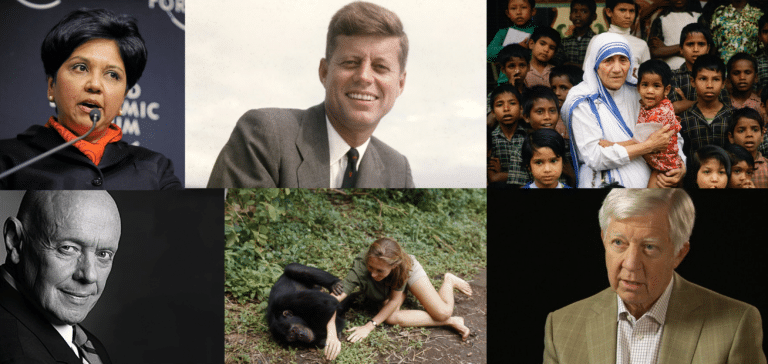Article Summary:
This article profiles several prominent modern leaders who have incorporated spirituality into their leadership, from JFK and Mother Teresa to Jane Goodall and Indra Nooyi. (This is part of a series on spirituality and leadership.)
+++
In recent years, there’s been a growing interest in spirituality and leadership—and the related efforts around workplace wellbeing, purpose, meditation, mindfulness, mental health, and more.
In previous articles, “Spirituality and Leadership—Leading with Heart and Love” and “How to Bring Spirituality into Your Leadership,” we noted that there are seven aspects of spirituality that can be applied to leading—and that love is an important part of the equation. See below.
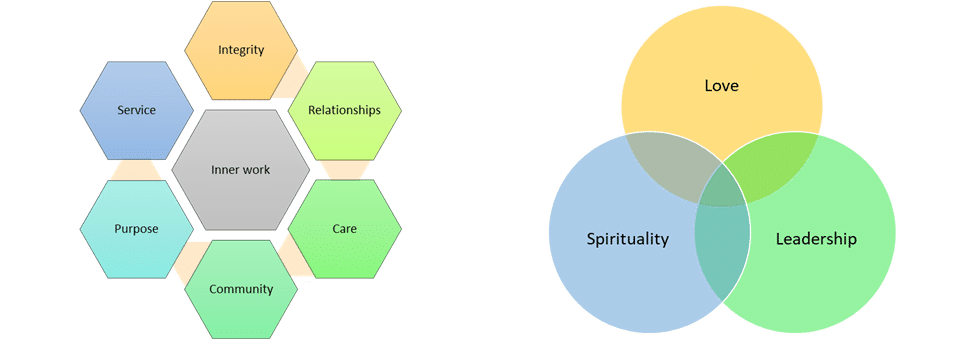
In our article, “Spirituality and Leadership in Action—Historical Examples,” we profiled Washington, Lincoln, Gandhi, Einstein, Dag Hammarskjöld, Nelson Mandela, and the Dalai Lama. Here we profile significant more modern leaders as case studies of spirituality and leadership in action: Mother Teresa, John F. Kennedy, Stephen R. Covey, Jane Goodall, Bill George, and Indra Nooyi. As before, none of these leaders is perfect, but their stories are instructive and revealing, and these leaders have influenced many people.

Leadership Derailers Assessment
Take this assessment to identify what’s inhibiting your leadership effectiveness. It will help you develop self-awareness and identify ways to improve your leadership.
Mother Teresa
Mary Teresa Bojaxhiu (1910-1997) was an Albanian-Indian Catholic nun who dedicated her life to serving the poor and destitute. She lived most of her life in India and founded a religious congregation called Missionaries of Charity, which grew to have more than five thousand religious sisters in more than a hundred countries. They adhere to the vows of chastity, poverty, and obedience—and to give “wholehearted free service to the poorest of the poor.” The Missions of Charity runs orphanages, schools, soup kitchens, family counseling programs, homes for people dying of HIV/AIDS, tuberculosis, and leprosy, and more.
At first, Mother Teresa felt fulfillment and joy from her calling to serve God, but after a while she fell into a deep spiritual darkness from what she called a “terrible emptiness, that feeling of absence of God” and longing for God’s love. She spoke often of slaking the thirst of Christ, noting that every time they helped a poor person, they were giving drink to Jesus on the cross. She received the Nobel Peace Prize and was later canonized as Saint Teresa of Calcutta.
Here’s Mother Teresa in her own words:
- “What a trust it is for God to place suffering people in our hands! It is a sacred vocation for us all, sacred because each of them is a life that God has created in His own image. Today, in this world, God has made us to be His love and compassion. We become His love as we pray and as we come to see His face in the lonely eyes of others.”
- “People are hungry for God.”
- “The most terrible poverty is loneliness, and the feeling of being unloved.”
- “The hunger for love is much more difficult to remove than the hunger for bread.”
- “Not all of us can do great things. But we can do small things with great love.”
- “It’s not how much we give but how much love we put into giving.”
- “A life not lived for others is not a life.”
- “Love is a fruit in season at all times and within reach of every hand.”
- “God doesn’t require us to succeed, he only requires that you try.”
- “Be kind and merciful. Let no one ever come to you without coming away better and happier.”
- “We are the poorest of the poor, more pitiful than the skeletons of Calcutta. In the West, you have another kind of poverty—spiritual poverty. This is far worse. People do not care for each other. You have the poverty of people who are dissatisfied with what they have, who do not know how to suffer, who give in to despair. The poverty of heart is often more difficult to relieve and to defeat.”
- “Do not wait for leaders; do it alone, person to person.”
- “I’m a little pencil in the hand of a writing God, who is sending a love letter to the world.”
John F. Kennedy
John F. Kennedy (JFK) was the 35th president of the U.S., serving during the height of the Cold War. He commanded several PT boats in the Pacific during World War II and earned the Navy and Marine Corps Medal.
As president, he initiated the failed Bay of Pigs Invasion in Cuba but then navigated the Cuban Missile Crisis successfully. He signed the first nuclear weapons treaty and presided over the launch of the Peace Corps and the development of the Apollo program after he challenged the nation to land a man on the moon. He supported the civil rights movement, and Congress enacted the Civil Rights Act of 1964 and many of his other proposals after his assassination. His book, Profiles in Courage, won a Pulitzer Prize.
Here’s JFK in his own words:
- “This country cannot afford to be materially rich and spiritually poor.” -Annual Message to the Congress on the State of the Union, January 14, 1963
- “Do not pray for easy lives. Pray to be stronger men.”
- “…I am certain that after the dust of centuries has passed over our cities, we, too, will be remembered not for victories or defeats in battle or in politics, but for our contribution to the human spirit.” -remarks at the National Cultural Center, November 29, 1962
- “The stories of past courage… can teach, they can offer hope, they can provide inspiration. But they cannot supply courage itself. For this, each man must look into his own soul.”
- “I look forward to a future in which our country will match its military strength with our moral restraint, its wealth with our wisdom, its power with our purpose.”

Alignment Scorecard
When organizations aren’t aligned, it can reduce performance dramatically and cause frustration and dysfunction. With this Alignment Scorecard, you can assess your organization’s level of alignment and make plans for improving it.
Stephen R. Covey
Stephen R. Covey (1932-2012) was a best-selling author, educator, business executive, speaker, and devoted family man. He earned an MBA from Harvard and a Doctor of Religious Education from Brigham Young University, later becoming a professor at Utah State University.
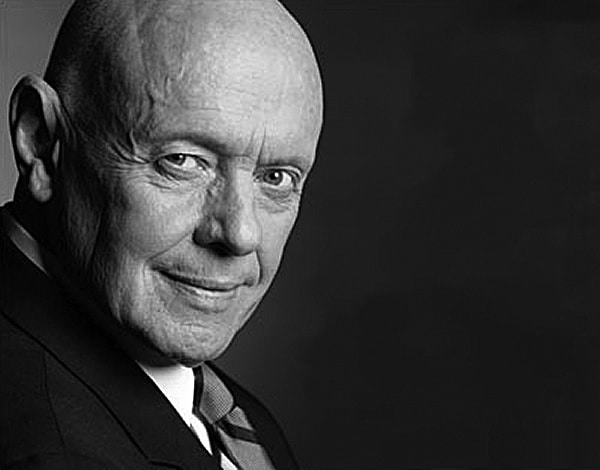
Covey’s book, The 7 Habits of Highly Effective People, has sold more than 40 million copies worldwide. He merged his company and formed FranklinCovey, a global firm providing training and productivity tools focused on enabling greatness in people and organizations based on character and principles.
Here’s Covey in his own words:
- “We are not human beings on a spiritual journey. We are spiritual beings on a human journey.”
- “To touch the soul of another human being is to walk on holy ground.”
- “Spiritual intelligence is the central and most fundamental of all the intelligences, because it becomes the source of guidance for the others.”
- “The spiritual dimension is your core, your center, your commitment to your value system. It’s a very private area of life and a supremely important one. It draws upon the sources that inspire and uplift you and tie you to the timeless truths of all humanity.” -from his book, The 7 Habits of Highly Effective People
- “Spiritual renewal takes an investment of time…. When we take the time to draw on the leadership center of our lives, what life is ultimately about, it spreads like an umbrella over everything else. It renews us, it refreshes us, particularly if we recommit to it.” -from his book, The 7 Habits of Highly Effective People
- “The main thing is to keep the main thing the main thing.”
- “Love is a verb. Love—the feeling—is the fruit of love the verb or our loving actions.” -from his book, The 7 Habits of Highly Effective People
- “Be a light, not a judge. Be a model, not a critic.”
Jane Goodall
Jane Goodall (1934-present) is an English primatologist, anthropologist, and conservationist. Her father gave her a stuffed toy chimpanzee when she was a child, sparking an early love of animals and nature. She became the world’s top expert on chimpanzees—now with six decades of studying them.
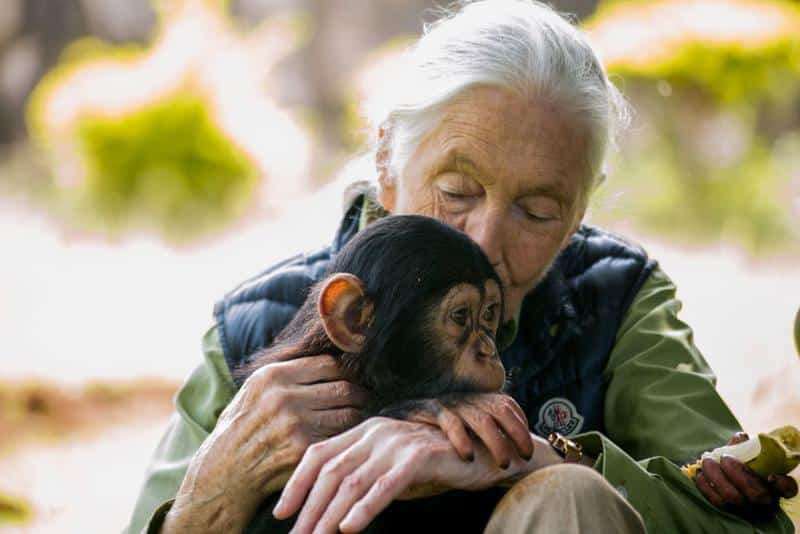
She founded the Jane Goodall Institute and the Roots & Shoots program (inspiring youth to work on environmental, conservation, and humanitarian issues). The U.N. named Goodall a Messenger of Peace. In 2021, she published her latest book, The Book of Hope: A Survival Guide for Trying Times, with Douglas Abrams and Gail Hudson.
She’s said that she believes in a higher power—something she’s called a divine intelligence. Her daily spiritual practice involves spending a half-hour under her favorite tree that she used to climb as a child and enjoying the company of robins and blackbirds.
Here’s Goodall in her own words:
- “After I’d begun to succeed with the chimps, that’s when I had time to pause and that’s when I developed a really strong feeling of spiritual connection with the natural world.”
- “Only if we understand, can we care. Only if we care, we will help. Only if we help, we shall be saved.” -from Jane Goodall: 40 Years at Gombe
- “We have so far to go to realize our human potential for compassion, altruism, and love.” -from Harvest for Hope
- “Each one of us matters, has a role to play, and makes a difference. Each one of us must take responsibility for our own lives, and above all, show respect and love for living things around us, especially each other.” -from Reason for Hope: A Spiritual Journey
- “It is these undeniable qualities of human love and compassion and self-sacrifice that give me hope for the future. We are, indeed, often cruel and evil. Nobody can deny this. We gang up on each one another, we torture each other, with words as well as deeds, we fight, we kill. But we are also capable of the most noble, generous, and heroic behavior.” -from Reason for Hope: A Spiritual Journey
- “What I love today is how science and religion are coming together and more minds are seeing purpose behind the universe and intelligence. Einstein did. And my good friend Francis Collins.”

Take the Traps Test
We all fall into traps in life. Often we’re not even aware of them. Check out these common traps of living to see what’s inhibiting your quality of life and fulfillment.
Bill George
Our friend and colleague, Bill George (1942-present), is the former CEO of Medtronic, a Harvard Business School professor, and the author of several classic leadership books including Authentic Leadership and True North.
He notes the impact of his meditation practice on his life. Before he started meditating several decades ago, he says, he was “a terror in the morning. I’d get all churned up about unimportant things and by 7:00 in the evening, I would want to fall asleep.” After he started meditating, he notes, “I had so much energy. My most creative ideas came out of meditation. I’d get great clarity about what was really important in the company.”
Here’s Bill George in his own words:
- “I have felt a sense of calling throughout my life to develop the gifts that our Creator endowed me with at birth to contribute to the world as a human being and as a leader.… I have often struggled to discern the difference between His calling and my many ego desires.… in this final third of my life, I am devoting myself to helping future leaders who are highly ethical and values-centered and who build great institutions that make positive contributions to the world.… Are you doing everything you can to develop your God-given gifts as a leader to be true to His calling—rather than your own desires—in order to make a positive impact on the world?” -remarks at the Willow Creek Community Church, 2008
- “Do you have a sense of well-being in your life? Well-being exists when you feel harmony, serenity, and a sense of fulfillment in your mind, body, and spirit.” -Bill George and Zach Clayton, True North: Emerging Leader Edition
- “Nurturing your spirit requires asking profound questions such as, ‘Why am I here?’ and ‘What is the meaning and purpose of my life?’ For most of us, it is hard to address these deep questions by ourselves. That’s why we need trusted people in our lives whom we can be fully open with as we share our deepest dilemmas, ask questions, and discuss different points of view.” -Bill George and Zach Clayton, True North: Emerging Leader Edition
Indra Nooyi
Indra Nooyi (1955-present) is an Indian-American business executive who served as CEO and chair of PepsiCo. As a child in India, she played cricket and guitar in an all-girl rock band. She’s a devout Hindu.
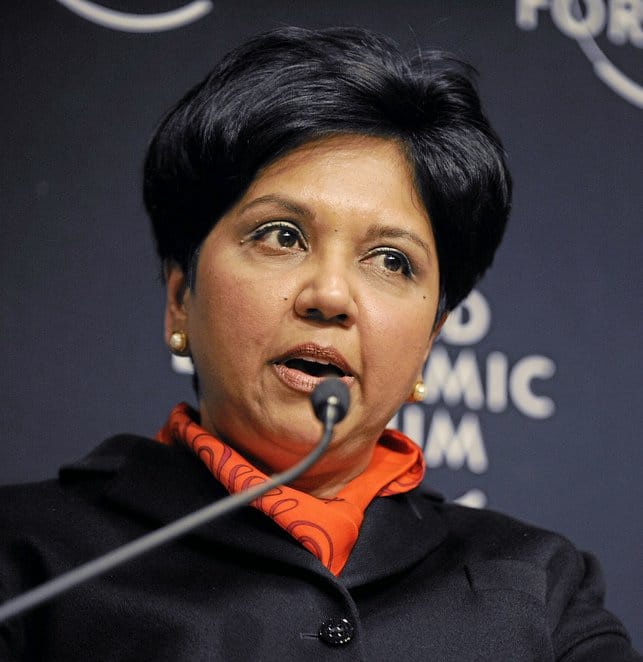
Nooyi worked for Johnson & Johnson, Boston Consulting Group, Motorola, and then PepsiCo. Fortune magazine ranked her the #1 Most Powerful Women in Business in 2009 and 2010, and she’s been named among TIME’s 100 Most Influential People in the World and one of America’s Best Leaders by U.S. News & World Report.
She led a strategic redirection of PepsiCo (“Performance with Purpose”), including a move toward healthier food offerings and a major focus on sustainability and organizational culture. During her 12-year tenure as CEO, the company’s revenues grew 80% and total shareholder return was 162%.
She now serves on the boards of Amazon and the International Cricket Council, co-director of the Connecticut Economic Resource Center, and chair of the U.S.-India Business Council. Here’s Nooyi in her own words:
- “I grew up in a Hindu household but went to a Roman Catholic school. I grew up with a mother who said, ‘I’ll arrange a marriage for you at 18,’ but she also said that we could achieve anything we put our minds to an encourage us to dream of becoming prime minister or president.”
- “An important attribute of success is to be yourself. Never hide what makes you, you.”
- “Most importantly, we want to create a company where every employee can bring their whole selves to work.”
- “Please help others rise. Greatness comes not from a position, but from helping build the future. We have an obligation to pull others up.”
- “Bring together what is good for business with what is good for the world.”
- “In the end, no matter how much money you make and how much success you create, what you are left with is family, friends, and faith.”
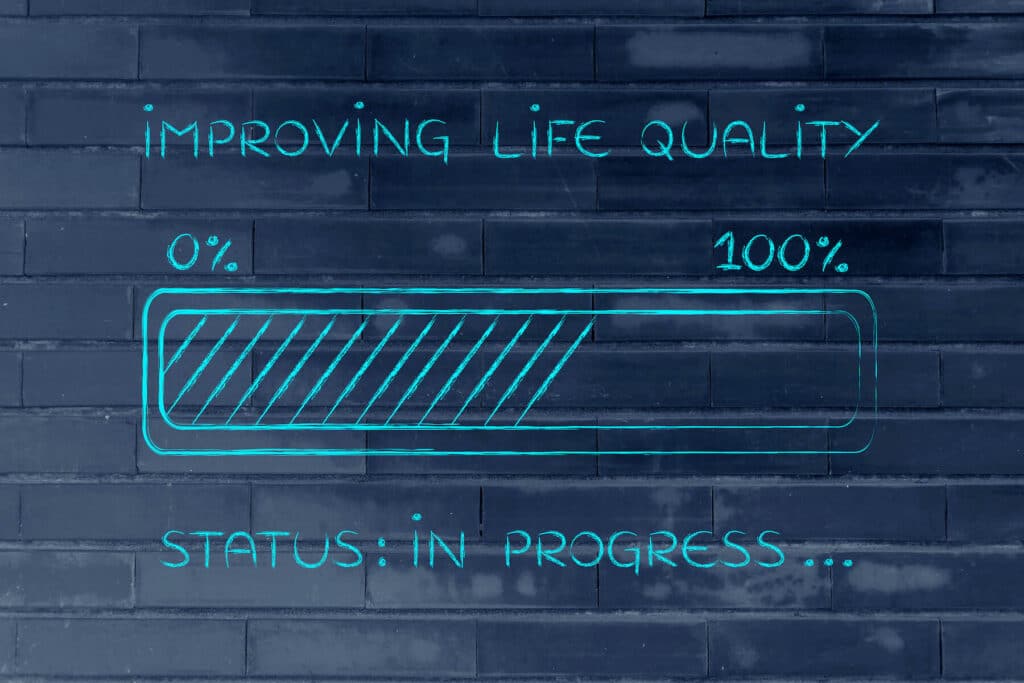
Quality of Life Assessment
Evaluate your quality of life in ten key areas by engaging with our assessment. Find your strongest areas, and the areas that need work, then plan accordingly!
Summary
These leaders from countries far and wide have integrated spirituality into their leadership practices with powerful results. They’ve left a remarkable legacy.
Reflection Questions
- Which leaders inspire you?
- How so?
- How might you incorporate spirituality into your leadership?
Tools for You
- Leadership Derailers Assessment to help you identify what’s inhibiting your leadership effectiveness
- Personal Values Exercise to help you determine and clarify what’s most important to you
- Alignment Scorecard to help you assess your organization’s level of alignment

Personal Values Exercise
Complete this exercise to identify your personal values. It will help you develop self-awareness, including clarity about what’s most important to you in life and work, and serve as a safe harbor for you to return to when things are tough.
Related Articles
- “On Spirituality and Leadership—Leading with Heart and Love”
- “How to Bring Spirituality into Your Leadership”
- “Spirituality and Leadership in Action—Historical Examples”
- “The Case for Love-Based Leadership”
- “How to Bring Love-Based Leadership to Your Workplace”
- “Love-Based Leadership in Action”
(See also our series on servant leadership.)
Appendix: Leaders Influenced by Religious or Spiritual Traditions
There are many examples of prominent leaders practicing or deeply influenced by religious or spiritual traditions. For example:
- Buddhism: Steve Jobs, co-founder, Apple; Marc Benioff, co-founder and CEO, Salesforce; Pierre Omidyar (founder, eBay); Yvon Chouinard, founder, Patagonia
- Christianity: S. Truett Cathy, founder, Chick-fil-A; Bob Buford, cable executive and founder, Halftime Institute; Arne Sorenson, former CEO, Marriott; Mary Kay Ash, founder, Mary Kay Cosmetics; David Green, founder, Hobby Lobby; Jimmy Carter and George W. Bush, former U.S. presidents
- Hinduism: Indra Nooyi, former CEO, Pepsico
- Islam: Malala Yousafzai, Pakistani activist
- Judaism: James Tisch, CEO, Loews Corp., Jeffrey Swartz, former CEO, Timberland
- New-Age Spirituality: Anita Roddick, The Body Shop; Tami Simon, founder, Sounds True; Ben Cohen and Jerry Greenfield, co-founders, Ben and Jerry’s; Oprah Winfrey, media entrepreneur and philanthropist
Quotations on Spirituality and Leadership
- “Once we discover our gifts and what moves us, the whole world takes on a new energy. Our life becomes a thing of spiritual significance.” -Richard Leider, author
- “What is needed now, more than ever, is leadership that steers us away from fear and fosters greater confidence in the inherent goodness and ingenuity of humanity.” -Jimmy Carter, former U.S. president
- “The spirituality of leadership is about aligning our lives with the Divine sources of energy that are intending this world to become a place of justice and love.” -Bill Grace, “The Spirituality of Leadership”
- “The spirit of service is a nudge felt by all humans. It is also a call answered by millions of Americans because of their religious beliefs…. Faith has long been a factor motivating humans towards service. In nearly every faith tradition, there is a premium given to the idea of helping others…. There is joy in seeking to make a difference because of a spiritual call from God.” -Rev. David E. Gray, Faith in Service

Triple Crown Leadership Newsletter
Join our community. Sign up now and get our monthly inspirations (new articles, announcements, opportunities, resources, and more). Welcome!
+++++++++++++++++++++++
Gregg Vanourek and Bob Vanourek are leadership practitioners, teachers, and award-winning authors (and son and father). They are co-authors of Triple Crown Leadership: Building Excellent, Ethical, and Enduring Organizations, a winner of the International Book Awards. Check out their Leadership Derailers Assessment or get their monthly newsletter. If you found value in this, please forward it to a friend. Every little bit helps!

